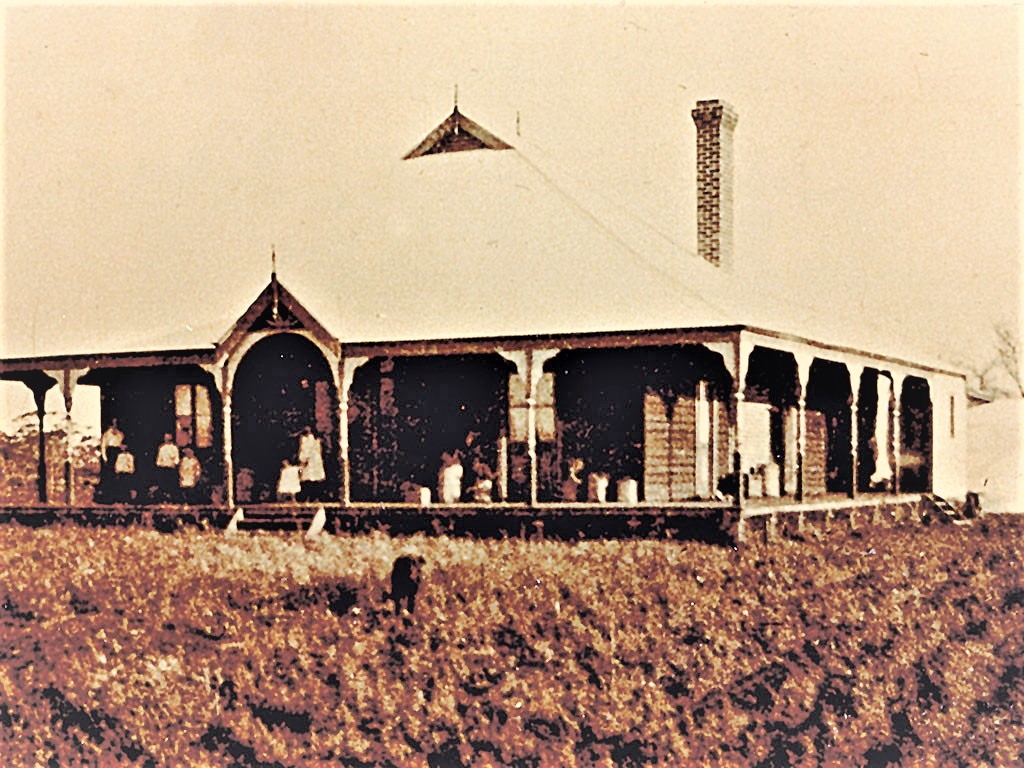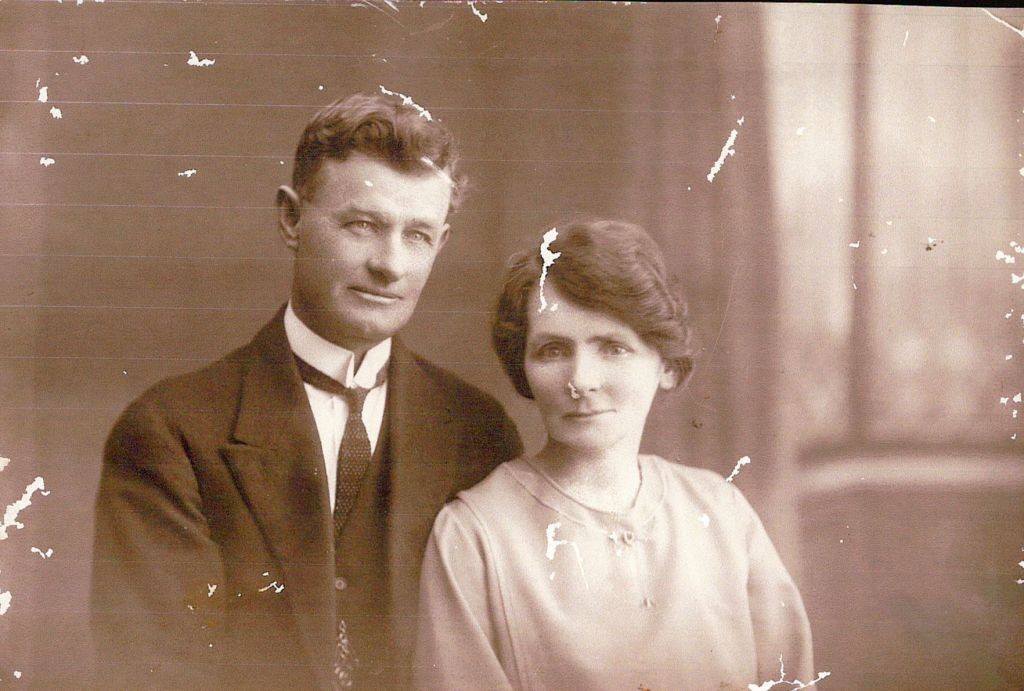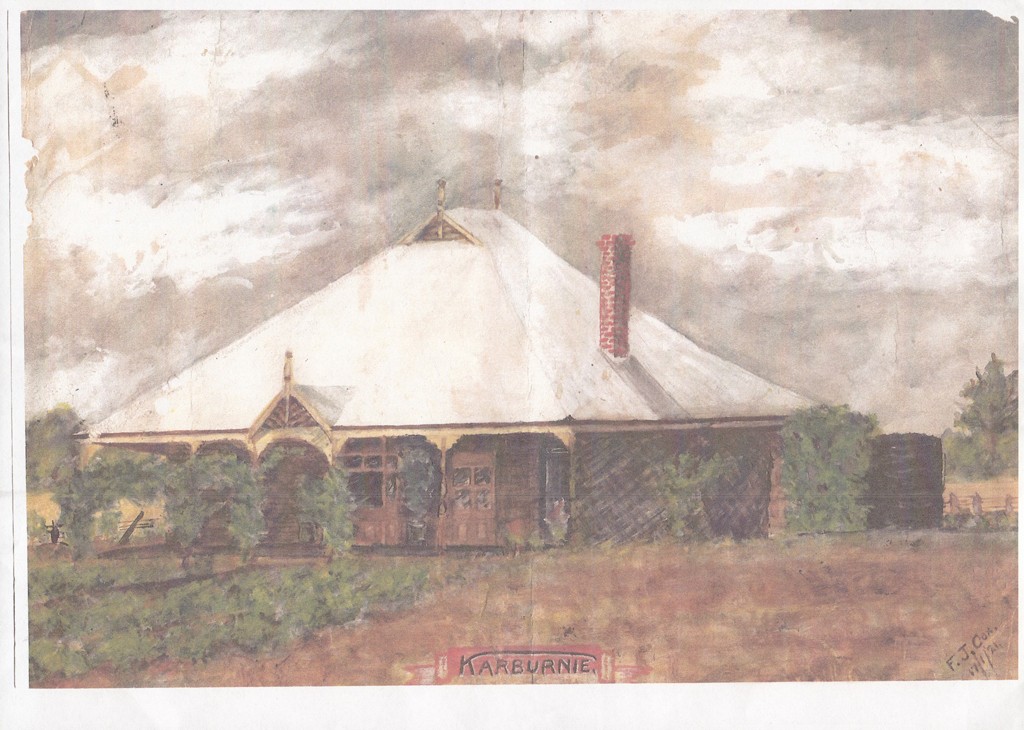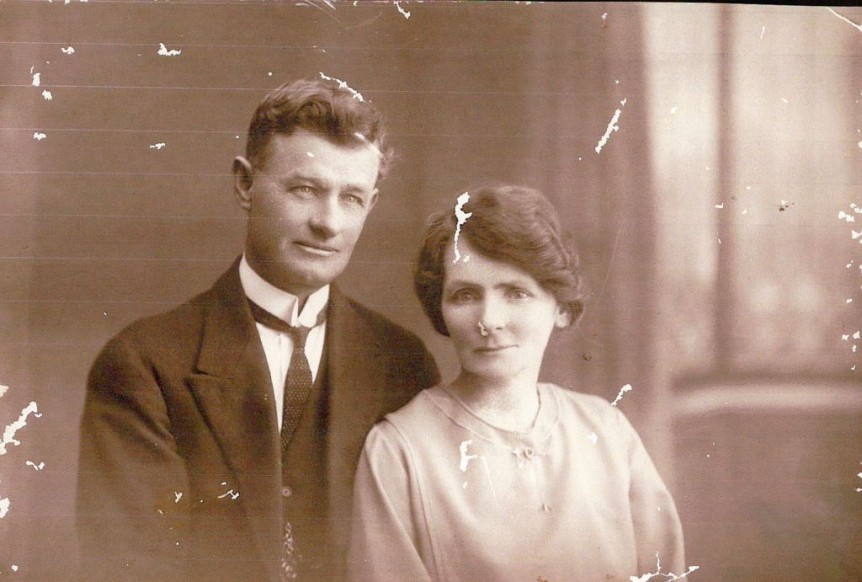To those that might read and enjoy this story it must be recognized that the facts that we have used here to build this story probably represent just a fraction of what the Fry’s actually undertook in terms of personal and community activities in their reasonably short stay at Tenindewa. This has all been researched and collated some 100 years after the event.
Norman Fry and his wife Marjorie have become somewhat the iconic settlers of Tenindewa. Norman was born in 1874 in Victoria and Marjorie in 1881 in Geraldton.
As mentioned Norman was a Victorian but after attending school and growing up in the “Valley” (The Western District) worked on various sheep stations throughout Victoria. In 1897 he came to Western Australia where he taught in the “State System” for four years. He taught at both the Leederville School in Perth and at Toodyay some 100 kilometers east of Perth
In 1903 Norman married Marjorie Hanlon in Geraldton following which they managed Kockatea Station owned by Copley Bros. in the Mullewa district for a further eight years. They then purchased their own property at Tenindewa, which they named “Kaburnie” and ran it for the next twelve years. In 1919 Norman’s father died and they then returned to the Victoria Valley with their children Adelia, Peter, Horace, Charles and Edith.
The property at Tenindewa was sold to a district “legend” Alexander Petroff who became the focus of the district’s most intriguing mysteries in which he simply, disappeared, leaving a pregnant wife, children and the farm, never to be seen or heard of again. By way of explanation it was feasible, given he was truly a refugee from the turmoil of the Russian Revolution, and given the speculation amongst residents and relatives, is that he succumbed to politically inspired foul play. Further to this there was also some evidence that he was closely related to Nicholas (Romanov) the second who was the last Czar of Russia and who perished along with his entire family at the hands of the Bolsheviks.
The following story about the Fry’s tells of a short but action packed and energetic cameo contribution to the then fledgling community of Tenindewa
As to why Norman and Marjorie (the Fry’s) became “iconic settlers” can be determined from the short story written by Doreen Lindsey about the first settlers and the early development of the Tenindewa township and district generally. In her story “To Sow the Barley” she outlines just a little of their lives in this humble outpost. She writes of the fact that they (the Frys’) were not only some of the earliest settlers but indeed the first people in the area to own a car. They had a successful racehorse named “Tenindewa” that on one occasion won the Yalgoo Cup to which a gold watch was presented. This watch still exists and keeps good time. It is in the hands of a Mr. Norman Keilar of Melbourne (April 2015) who is the Grandson of Norman and Marjorie Fry. Interestingly Alex Petroff also purchased this horse “Tenindewa” at the time of the farm purchase so maybe that may have had something to do with his absconding? It (the horse) might have run out of steam after Yalgoo?
Something that has not run out of steam but not dissimilar to the watch is a Rushton Proctor Steam Engine that Fry purchased in 1906 . This machine was built in 1904 and purchased by Fry and hauled to Tenindewa in 1906 from Geraldton and fantastically and remarkably is still operating and in as new condition. It is currently owned and displayed regularly by the Royal Agricultural Society of WA. It was used for cutting chaff and the like at Tenindewa before it was on-sold to Petroff and then to the OBrien Family and eventually after many years of idleness was acquired by a team of steam enthusiasts, transported to Toodyay, and rebuilt under the watchful eye and artful hands of a Mr. Peter Dymond. It can be seen in operation at various shows but especially at the Royal Show in Claremont at the Showgrounds there.
Racing was obviously very important as on “Kabernie” they (the Fry’s) had a racecourse built on the property but what set them apart was the “stately home” which again according to Doreen’s book “featured verandahs all round with grape vines flourishing”. Also it had “position” so to speak. It was not only located in a reasonably picturesque little paddock but it was clearly visible from the Railway Station, the main road and the village itself. That classic bungalow house stood until about 1980. It became known colloquially as the “Big House”. Again, note Doreen’s comment in respect to Christmas Tree events at Tenindewa in those years; “Some of these occasions were also held in Fry’s big house over the line” (The house was completed in May 1914 and the contractor/builder was Mr Bert Crothers)
There are photographs and even a painting of that place still around today.
Generosity of spirit flows strongly in this story as it was reported in the Geraldton Guardian on the 21st of September 1916 that the Frys hosted the “Mullewa and Tenindewa Farmers Association Annual Picnic”
“There were horse races for the farmers that fancied their horse could gallop and there were some interesting finishes”. “Plenty of fruit and sweets were distributed amongst the kiddies and a tank of boiling water was available all day (It’s a thirsty place). Mrs. Stokes and Mrs. Fry and many others helped to make the thing a success”.
Being a Victorian it is not surprising Norman featured in other sporting pursuits evidenced by the Guardian report of March 1912. The Tenindewa cricket team triumphed over Mullewa at Tenindewa but sadly on that occasion he was run out for a duck. In later life, in Hamilton Victoria, he participated in Lawn Bowls well into his 90s.
It is known that Norman and Marjorie were strong Christians and of the Presbyterian faith which is evidenced by the baptismal records of second son Horace. He was christened by the Rev. W. Floyd Shannon B.A. in Geraldton on the 1st of September 1909. In fact Horace revisited Tenindewa in 1988 and was shown around by the late Keith Butler whose family would have lived just 350 meters east of the Fry’s in those early times.
It must be acknowledged here that Horace’s daughter (and thus Norman’s granddaughter), Wilma Preston of Port Fairy in Victoria has been of massive assistance in the compilation of this material.
Their Christianity, Community Spirit and a vision for the future was demonstrated most overtly when the first school at Tenindewa opened on the 31st of March 1913 in a building donated by the Fry’s. In some ways this is not so surprising given Norman’s initial educational based vocation.
The building was one room some 20 feet (6 meters) by 12 feet (3.2 meters), which had an iron roof, a new jarrah floor with hessian walls and was situated just across the paddock at the corner of the main Mount Magnet to Geraldton Road and the Menang Road
One acre of land was included with this building on the understanding that the Education Department would be responsible for the costs of the survey and land transfer fees. (All donated by Fry)
The first teacher was Miss Eva Stafford who was eldest daughter of another of the pioneer settlers.
Norman Fry became an inaugural member of the Mullewa Road Board and indeed the second Chairman of the Mullewa Road Board after Mr. D Warren. Norman served the Board from and including 1911 until 1914 with the last two as Chairman. During his tenure as Chairman a decree was pronounced that “Road Board meetings were to be always called on the night of the full moon so that any members who rode to the meetings could see their way home.” Norman would have to have ridden some 11 miles home (20 kilometers) after meetings. No doubt he presided over far more important issues than that but “the decree” is a subtle reminder of logistics to be considered in that age that we have for many years have forgotten and now take for granted as a non-issue.
Norman also spent a further 21 years in local government after his return to Victoria on the Mt Rouse Shire. Included in that was another (4 year) term as President.
An example of his agricultural prowess it was reported in the Sunday Times in WA on the 9th of October 1910. (Quoted exactly as written, in the style of the day)
“Mr. Fry presents another example of what can be done by hard work and perseverance. With capital of less than one hundred pounds ($200), he selected 619 (248 hectares) acres of land at “Woolya”, (as Tenindewa was called then) 55 miles (80 Kilometers) from Geraldton; a little over two years ago and immediately proceeded to work to get the quickest possible return. His family consisted of five, himself and wife three children, and there was no time to be lost.
The country was typical of the wheat-lands, consisting of light sandy loam, timbered with salmon gum, gimlet and jam, and ringbarking was engaged at once, this work being varied by the building of a two roomed iron house and the preparation of a homestead garden.
Helped by the Agricultural Bank, his position last season, 18 months after starting, was that he had all his land fenced with six and a half mile (11 kilometers) of good 6-wire fencing, 200 acres (80 hectares) cleared and cropped and 240 acres (96 hectares) ringbarked. From the 200 acres (80 hectares) he stripped 184 acres (72 hectares) for an average of 20 bushels (1.33 tonne per hectare) and the remaining 16 acres (6.6 hectares) for a return of 20 tonnes of hay.
This season there are some 300 acres (120 hectares) under crop, all looking well and a further area ringbarked and cleared ready for the coming season.
He has bought all the machinery he requires, some of which is fully paid for, and the whole is well housed in substantial sheds.”
It is documented also that the Fry’s purchased Lease 93/1968 on the 1st of October 1908 which was of some 4000 acres. (1600 hectares) This would have made them substantial landholders in terms of the acreage generally held in that area in those days. This holding was immediately to the south of the original purchase at “Kaburnie” Not one to die wondering Norman experimented various crops during his time at Tenindewa and in March 1916 we see the Geraldton Guardian report him experimenting with Ambercane, Sweet Clover, Egyptian Millet, Guinea Corn Maize and last but certainly not least, Cotton.
After returning to Victoria, Norman then purchased his brother John’s farm “Springbank” but sold it after a few months. In April 1920 they purchased a property at Penthurst which they named “Kaburnie” after his farm in The West. After a life associated with agricultural and pastoral pursuits Norman and Marjorie retired to Hamilton 1947. Marjorie passed away in 1956. Norman was blessed with a long life, cheerfully coping with blindness in his later years, passing away just 3 days short of 99 years. (1974)
Mullewa Notes (From an occasional Correspondent)
A speech at the opening of the Mullewa Town Hall
September 20th 1912
Mr. Norman Fry, who also spoke,
said, he had been asked, to say a few
words on behalf of the residents of
Tenindewa, and he felt honored in be
ing one of the first to address them in
their new hall. The building was a
credit to all concerned and one of
which he thought they might well
feel proud. The occasion, he said,
marked an era in the progress and
prosperity of the district. They had
only to look round the town to see
evidences of the progress and develop-
ment which was taking place. Most
conspicuous amongst these were the
new hotel, Mr. Molster’s store, the
new police station and quarters, and
last but not least the hall in which
they were then assembled. Going a
little further, they saw the country
around them being converted from
a wilderness of scrub into smiling
cornfields promising a bountiful har
vest. Mr. Fry stated that it was 12
years ago since he first landed in the
Mullewa district. At that time, no
one with the exception of Mr. Smith
had done anything in the way of cul
tivation, the district being considered
unsuitable for farming purposes. He
experimented with 5 acres at Kocka-
tea in 1901 and being encouraged by
the results he gradually increased the
area and he thought he could justly
take the credit of being the first to
demonstrate that payable crops could
be produced. At any rate, he was the
first to sell locally grown chaff. In
1901 there were 5 acres under crop In
the district. To-day there were 5000
acres in addition to 3000 acres under
fallow. People were only just begin-
ning to realise the capabilities of the
district as a farming centre but he
felt sure that it would always hold
its own with even some of the most
favored locality in the Victoria Dis
trict.
November 25th 1919
Tenindewa Notes (From an occasional Correspondent)
On November 1st the residents of Tenindewa assembled in the Co-operative Hall and organized a social function to be farewell to Mr. and Mrs. Norman Fry and family, who have disposed of their farming property here and are about to leave for Victoria, where they intend to take up their residence. The weather was rather stormy, and as a result many who would have been present were debarred owing to rain and darkness. Even as it was the hall was comfortably filled and dancing, alternating with a few vocal events was kept up until the early hours of the morning.
During the evening light refreshments were supplied and at the interval in the dancing several speakers representing the Cooperative Co. and the local branch of the Farmers and Settlers Association, took the opportunity of wishing Mr. Fry and his family a safe voyage and heaps of good luck and happiness in their new home.
Mr. Valentine, on behalf of the young ladies of the district, presented presented Miss Norma Fry, who conducted the local Post Office for the last two years, with a very pretty ladies handbag as a great token of the esteem in when she was held and Miss Fry suitably thanked the doners in a happy speech, which by the way was her maiden effort.
Some of the speakers referred in no uncertain terms to the good work Mr. Fry had done in the many public positions that he had occupied here, and to the fact that they were loosing one of the pioneers of the district. Mr. Fry deserved credit for bring the first stump jump plough to the district, and reaper and binder, and making the first locally grown chaff as early as 1903.
Mr. Fry thanked those present, as well as the speakers, for the opportunity they had afforded him and his family of personally saying farewell to their many friend and well wishers and the speakers for the kind things that they had said during the evening. He assured them that Tenindewa and its people would always occupy a warm spot in their hearts and if fate should ever lead their steps westward in the future, Tenindewa would be the first port of call.
On Saturday the 15th last, as the family of “Kaburnie” were scanning the papers and making preparations for retiring for the night, the house was stormed by a band of youths and lasses, mostly from Devils Creek, who took possession. Mr. O’Brien acted as spokesman, that owing to the boisterous weather they were unable to be present at the previous gathering and they were not going to be deprived of an opportunity of saying farewell to Mr. and Mrs. Fry and family. Therefore they invited the family and the company to the hall, which was specially arranged and dancing and song were the order of the evening.
Mr. Valentine. on behalf of the company, presented Mrs. Fry with a very pretty cameo broach, and wished her and her family good health and a happy and prosperous future. Mr. Fry responded on her behalf and thanked those present for the pleasant surprise they had given and for the verbal and tangible of good wishes etc. and he assured them that Mrs. Fry would always treasure their gift. The gathering broke up in the early hours of the morning after singing “they are jolly good fellows” and “Auld Lang Syne”.
Mr. Fry and family left or Geraldton by Friday’s train where they will stay for eight or ten days, prior to leaving for Perth. They will leave the State by the “Wandilla” on December the 13th.








Comments
Norman Fry was my great grandfather. ironically I now live on a farm at Penshurst, not far from ‘Kaburnie’.
Love this whole thing am proud to be connected to such a great family
Charles Fry was my father who passed away in 1984, I am looking for any photos or stories that might be out there you can contact me via email on janet_f64@bigpond.com.au thanks
Such a fascinating and amazing story. Love that part of Kaburnie is still a part of the Fry farming family. My kids love going to work with their dad and we love sharing this history with them.
Am looking for information on James Jordan Fry, my great grandfather. He also came from Victoria and worked around Northampton/Geraldton. Any info would be welcomed.